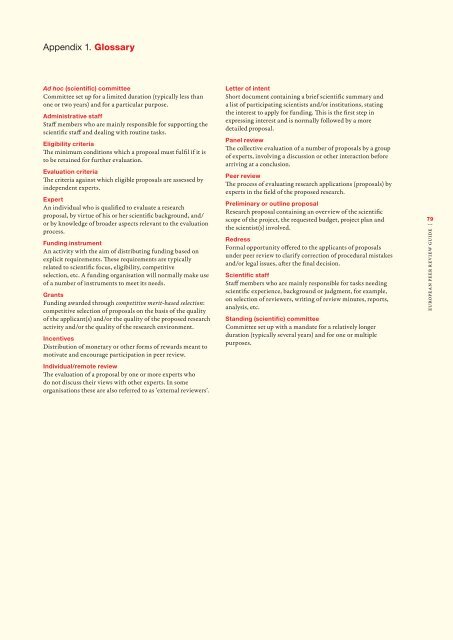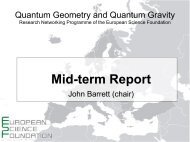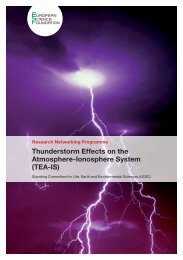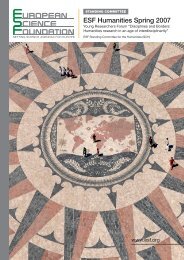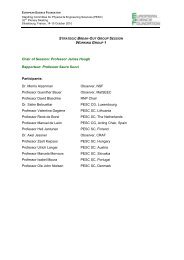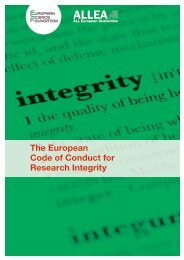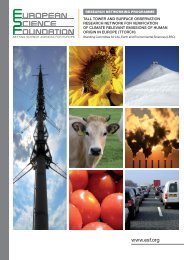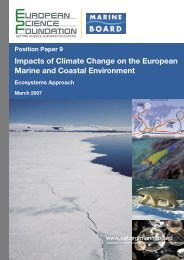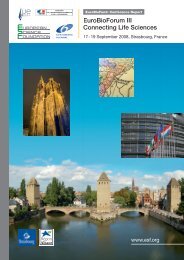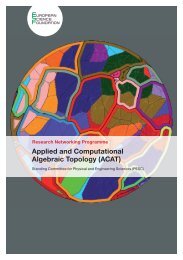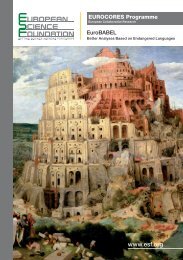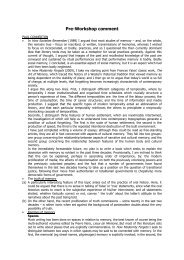European Peer Review Guide - European Science Foundation
European Peer Review Guide - European Science Foundation
European Peer Review Guide - European Science Foundation
Create successful ePaper yourself
Turn your PDF publications into a flip-book with our unique Google optimized e-Paper software.
Appendix 1. Glossary<br />
Ad hoc (scientific) committee<br />
Committee set up for a limited duration (typically less than<br />
one or two years) and for a particular purpose.<br />
Administrative staff<br />
Staff members who are mainly responsible for supporting the<br />
scientific staff and dealing with routine tasks.<br />
Eligibility criteria<br />
The minimum conditions which a proposal must fulfil if it is<br />
to be retained for further evaluation.<br />
Evaluation criteria<br />
The criteria against which eligible proposals are assessed by<br />
independent experts.<br />
Expert<br />
An individual who is qualified to evaluate a research<br />
proposal, by virtue of his or her scientific background, and/<br />
or by knowledge of broader aspects relevant to the evaluation<br />
process.<br />
Funding instrument<br />
An activity with the aim of distributing funding based on<br />
explicit requirements. These requirements are typically<br />
related to scientific focus, eligibility, competitive<br />
selection, etc. A funding organisation will normally make use<br />
of a number of instruments to meet its needs.<br />
Grants<br />
Funding awarded through competitive merit-based selection:<br />
competitive selection of proposals on the basis of the quality<br />
of the applicant(s) and/or the quality of the proposed research<br />
activity and/or the quality of the research environment.<br />
Incentives<br />
Distribution of monetary or other forms of rewards meant to<br />
motivate and encourage participation in peer review.<br />
Individual/remote review<br />
The evaluation of a proposal by one or more experts who<br />
do not discuss their views with other experts. In some<br />
organisations these are also referred to as ‘external reviewers’.<br />
Letter of intent<br />
Short document containing a brief scientific summary and<br />
a list of participating scientists and/or institutions, stating<br />
the interest to apply for funding. This is the first step in<br />
expressing interest and is normally followed by a more<br />
detailed proposal.<br />
Panel review<br />
The collective evaluation of a number of proposals by a group<br />
of experts, involving a discussion or other interaction before<br />
arriving at a conclusion.<br />
<strong>Peer</strong> review<br />
The process of evaluating research applications (proposals) by<br />
experts in the field of the proposed research.<br />
Preliminary or outline proposal<br />
Research proposal containing an overview of the scientific<br />
scope of the project, the requested budget, project plan and<br />
the scientist(s) involved.<br />
Redress<br />
Formal opportunity offered to the applicants of proposals<br />
under peer review to clarify correction of procedural mistakes<br />
and/or legal issues, after the final decision.<br />
Scientific staff<br />
Staff members who are mainly responsible for tasks needing<br />
scientific experience, background or judgment, for example,<br />
on selection of reviewers, writing of review minutes, reports,<br />
analysis, etc.<br />
Standing (scientific) committee<br />
Committee set up with a mandate for a relatively longer<br />
duration (typically several years) and for one or multiple<br />
purposes.<br />
79<br />
<strong>European</strong> <strong>Peer</strong> <strong>Review</strong> <strong>Guide</strong>


